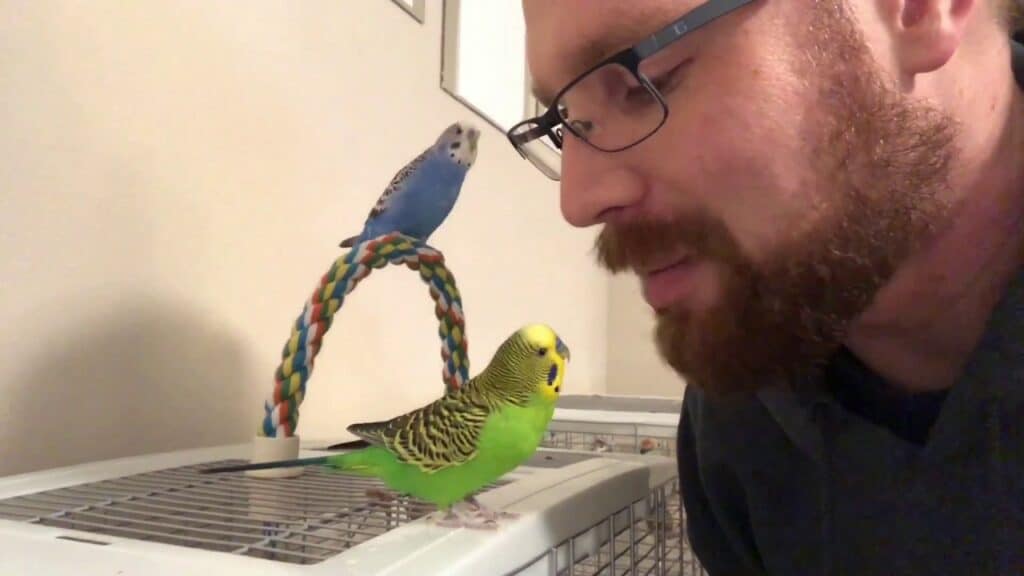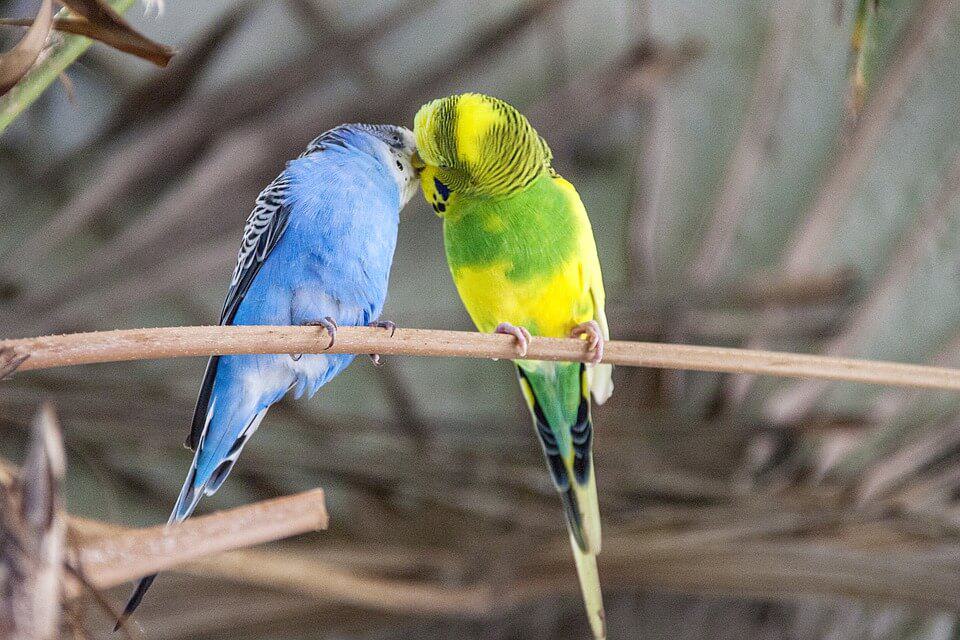Hey there, ever wondered if parakeets are smart? I sure have!
These colorful little birds are a common sight as pets, but do they have more going on in their heads than we think?
In this article, we’re going to explore just how clever parakeets really are.
We’ll chat about their problem-solving skills and how they behave with others.
So, let’s dive into the world of parakeet smarts and find out what makes them tick!
Are Parakeets Smart?
Yes, parakeets are indeed considered to be intelligent birds.
While they may not possess the same level of cognitive abilities as some of the more advanced parrot species, parakeets, also known as budgerigars, display a range of intelligent behaviors that showcase their adaptability and problem-solving skills.
Parakeets are known for their ability to learn tricks, mimic human speech, and even solve simple puzzles.
They can quickly learn to recognize their owners, respond to cues, and perform various tasks.
Additionally, parakeets exhibit social intelligence by forming bonds with both humans and other birds.
They can communicate with body language, and vocalizations, and even adapt their behavior based on the situation.
In the wild, parakeets are skilled at finding food sources, avoiding predators, and navigating their environment.
Their natural instincts and ability to adapt to changing conditions demonstrate a certain level of intelligence.
Overall, while they might not be on par with some of the highly intelligent parrot species, parakeets are certainly smart and have the capacity to learn, communicate, and interact with their surroundings in impressive ways.
How Smart Are Parakeets?
The insightfulness of a parakeet can be judged by the various attributes that it has:
1. Parakeets Can Talk

It is astonishing to learn that parakeets can actually talk.
But owners would confirm that these birds can not only talk but are also really good at memorizing.
2. Parakeets are Trainable
Parakeets are quick learners and easy to train.
If trained well, they can perform a number of activities.
Parakeets can be trained to talk, train to entertain, train to understand, and more.
3. Parakeets Can Play Games with You
Parakeets are playful pets.
They can learn and play multiple games.
One of the most common of those includes the ring placement game where the parakeet is given small rings.
It holds the ring in its beak and places it on a hook.
This is an interesting game.
It can be a fun playtime with a parakeet.
The game is interesting for both, the pet itself as well as the pet owner.
4. Fly Directly Towards You
Once you train your parakeet, they are likely to understand your cue words and actions.
You can place your finger pointing towards your parakeet and say your cue word that it understands for example, ‘come’ or it may be his name or any other thing, or you can act like you are calling it, and it will respond accordingly.
Another technique can be giving your pet parakeet a small treat such as sunflower seed or praising him with words that it understands.
Or you can also use a whistle to call it towards you.
5. Do Tricks like Somersaults
A parakeet may do somersaults or flip on the owner’s hands as a sign that it wants something, or maybe as an indicator that it wants to play, or may do it just as a fun activity.
However, this shows how creative and thoughtful these creatures are in their actions.
6. Mimic Words, Actions, As Well As Behaviors
Parakeets are considered to be one of the most vocal birds in the family of a parrot.
Usually, when the parakeet is tweeting a song, mimicking some words, or talking; it means that they are happy.
Parakeets basically have thick tongues which allow them to mimic and imitate human speech sounds.
Moreover, the thickness of the tongue and the place where the parakeet positions it in its mouth enables it to produce such sounds.
These sounds are produced when the air passes through the syrinx, following the movement of the tongue that produces sound in the bird’s mouth and throat.
Parakeets can mimic the words that they have most often heard.
7. Parakeets Can Socialize With Their Owners
Being a highly intelligent species, parakeets are able to recognize the voices of their owners and respond accordingly.
They love to play with their owners and act likewise to what is being said if domesticated properly.
Moreover, they are likely to talk around their owners which is a sign of attentiveness and affection towards their owners.
8. Parakeets Can Socialize With Others
If a person other than their owner tries to interact with a parakeet, he would have to be soft and humble and not terrorizing.
However, they may hesitate at first but if you’ll make them comfortable and assure them of not hurting them by your actions, they are more likely to socialize with you in a very short time.
Parakeets are usually not frightened of interacting, but they are not likely to interact when they are terrorized.
9. Parakeets Can Socialize With Other Parakeets

Parakeets are very loving and immensely social birds.
They love speaking to each other and would contently spend their time inside the cage if they were with another parakeet.
Moreover, they love spending time with their partners so much so that if they have one, you may forget about your bonding with your parakeet.
10. Parakeets Can Express Emotions
Parakeets are very affectionate birds towards humans.
They may flap their wings, follow you, cuddle you, mimic you, and regurgitate food as a means of affection.
These birds are able to bond with you and love you hence, they show their affection in such ways.
However, there are some exceptional cases where a parakeet may not express its emotions.
And it may be because of some external and internal factors.
These factors may impact their feather picking or self-mutilation, loss of appetite, fear, aggression, boredom, sickness, and change in vocalization, etc.
11. Parakeets Can Adapt Easily
Parakeets are smart since they can adapt to new environments, as well as new places.
They become friends in no time and get adjusted to a changed atmosphere accordingly.
12. Scientifically Proven
Though the above-mentioned abilities of a parakeet are enough evidence to label them as smart birds to make the claim stronger, it should be noted that parakeets are considered to be one of the smartest birds according to the brain to body size ratio.
They have smaller bodies therefore the brain size is a longer number in the numerator.
Fun Fact
According to the standard pet intelligence tests, parakeets are much smarter than dogs!
Astonishing, right?
How to Keep Parakeets Smart?
Parakeets should be taken good care of, and it should be ensured that they use their brains routinely.
- Their brain should be regularly and frequently stimulated to keep them active and avoid the boredom and depression of the bird.
- They should be given different toys and perches.
- It should be made sure that the parakeet gets regular exercise.
- Health care shall be maintained.
- Place them in big enough cages so that they have plenty of living space.
- Let them out of cages to fly and play from time to time.
Conclusion
In conclusion, the world of parakeet intelligence is a captivating one, filled with intriguing behaviors and remarkable feats.
While parakeets may not possess the advanced cognitive abilities of some other avian species, their intelligence shines through in their ability to learn, adapt, and connect with both their human companions and fellow parakeets.
Through their knack for problem-solving, mimicry, and social interactions, parakeets have carved a unique niche for themselves in the world of pet birds.
Their capacity to recognize faces, respond to cues, and even mimic human speech showcases their cleverness and adaptability.
As we’ve discovered, parakeets are far from simple creatures.
Their vibrant personalities and inquisitive nature underscore their intelligence.
Whether it’s their endearing quirks or their ability to learn tricks, these feathered companions continue to amaze us with their smarts.
So, the next time you watch your parakeet explore its cage or respond to your voice, remember that there’s more going on behind those bright eyes than meets the eye.
Parakeets might be small, but their intelligence is undoubtedly a big part of what makes them such cherished members of our households and our hearts.
FAQ
Are parakeets intelligent birds?
Yes, parakeets are considered intelligent birds. While they may not match the cognitive abilities of some larger parrot species, they display a range of smart behaviors, including problem-solving, mimicry, and social interaction.
Can parakeets learn tricks?
Absolutely! Parakeets are quick learners and can be taught a variety of tricks with proper training and patience. Simple tricks like stepping onto your finger, flying to your shoulder, or retrieving objects are within their capability.
Can parakeets mimic human speech?
Yes, parakeets have the ability to mimic human speech and other sounds. While they may not be as proficient as larger parrot species, some parakeets can learn to repeat words, phrases, and even mimic household sounds.
Do parakeets solve puzzles and problems?
Parakeets do exhibit problem-solving abilities. They can figure out how to access food, toys, and navigate their environment. Providing them with puzzles and challenges can engage their intelligence and keep them mentally stimulated.
How do parakeets show social intelligence?
Parakeets are social birds that form strong bonds with their owners and other birds. They communicate through body language, vocalizations, and actions, adapting their behavior based on different situations.
Last Updated on August 28, 2023 by Lily Aldrin

